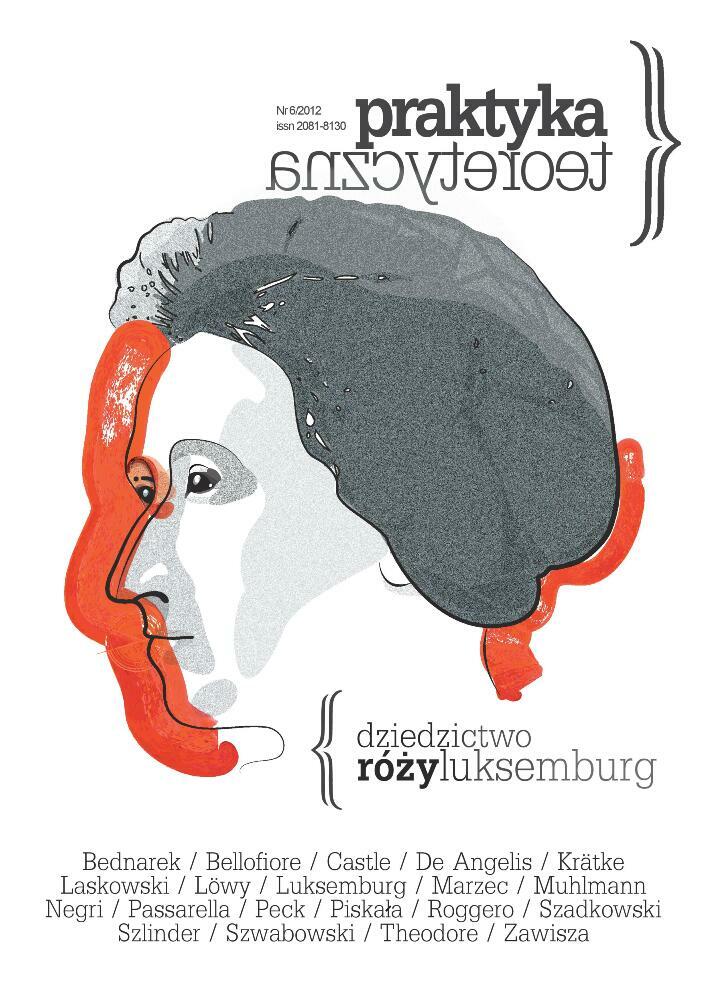Abstract
This article attempts to present some reflections about Rosa Luxemburg’s
works from the first Russian revolution (1905-1906). I consider Luxemburg’s
view on the historical meaning of this revolution and discuss her analyses of class
struggle in 1905-1906. The description of class struggle’s forms and its dynamics
is the most important and interesting excerpt of Luxemburg’s works from this time.
She emphasized the meaning of a revolutionary sense of freedom and the changing
workers consciousness that happens during the revolution. She presents an inspiring
dialectic relation between defeated rebellion or revolution and the final victory of
socialist movement. I think that Luxemburg’s perspective may be useful for research
on contemporary social struggles (e.g. “Arab Spring”, “Occupy!”) and helpful in
searching for new forms of organization for radical liberation movements.
References
Badiou A. 2010. The Communist Hypothesis. London-New York: Verso.
Donald M. 1993. Karl Kautsky and the Russian Marxists 1900-1924. Yale: Yale University Press.
Figes O. 2009. Tragedia narodu: rewolucja rosyjska 1891-1924. Wrocław: Wydawnictwo Dolnośląskie.
Ilkowski F. 2012. Rewolucja według Róży Luksemburg. W Lewica polska t. 1: Koncepcje i ludzie. Wrocław.
Kaczanowska J., F. Tycha. 1962. „Bibliografia pierwodruków Róży Luksemburg”. Z pola walki 3.
Karwacki L. 1971. „Walka o wprowadzenie tzw. „konstytucjonalizmu fabrycznego” w latach rewolucji 1905-1907 w Łodzi”. Rocznik Łódzki. Łódź.
Karwacki W. L. 1975. Łódź w latach rewolucji 1905-1907. Łódź.
Kołakowskiego L. 2009. Główne nurty marksizmu. t. 2. Warszawa: Aneks.
Kormanowa Ż. 1949. Materiały do bibliografii druków socjalistycznych na ziemiach polskich w latach 1866-1918. Warszawa : Książka i Wiedza.
Kotlarski G. 1987. Myśl społeczna Róży Luksemburg: próba rekonstrukcji historiozofii. Poznań : Wydawawnictwo Naukowe Uniwersytetu im. Adama Mickiewicza.
Kowalik T. 1971. Róża Luksemburg: teoria akumulacji i imperializm. Wrocław-Warszawa-Kraków-Gdańsk.
Lenin W. 1985. Dwie taktyki socjaldemokracji w rewolucji demokratycznej. W Dzieła wszystkie t. 11. Warszawa: Książka i Wiedza.
Lenin W. I. 1986. Przedmowa do listów K. Marksa do L. Kugelmanna. W Dzieła t. 14. Warszawa: Książka i Wiedza.
Luksemburg R. 1905. „Akcja „pokojowa” PPS”. Czerwony Sztandar 27 (8).
Luksemburg R. 1905. „Dni czerwcowe (Kartka z historii walki robotników francuskich)”. Przegląd Robotniczy 6.
Luksemburg R. 1905. „Powstanie petersburskiego proletariatu”. Czerwony Sztandar 23 (3).
Luksemburg R. 1905. Błagalny pochód proletariatu. W Wybuch rewolucyjny w caracie. Przegląd Socyaldemokratyczny.
Luksemburg R. 1908. „Akcja rewolucyjna”. Czerwony Sztandar 1905 23 : 6-8
Luksemburg R. 1959. Dwa obozy. W Wybór pism t. 1. Warszawa: Książka i Wiedza.
Luksemburg R. 1959. Strajk masowy. W Wybór pism t. 1. Warszawa: Książka i Wiedza.
Luksemburg R. 1959. W łunie rewolucji. W Rewolucja w Rosji. W Wybór pism t. 1. Warszawa: Książka i Wiedza.
Luksemburg R. 2008. Rewolucja w Rosji. W O rewolucji: Rosja 1905, 1917. Warszawa: Książka i Prasa.
Luksemburg R. 2011. Akumulacja kapitału: przyczynek do ekonomicznego wyjaśnienia kapitalizmu. Warszawa: Książka i Prasa.
Luksemburg R. 2012. Rok rewolucji. http://www.praktykateoretyczna.pl/index.php/roza-luksemburg-rok-rewolucji/.
Luksemburg R. 2012. Taktyka rewolucji. http://www.praktykateoretyczna.pl/index.php/roza-luksemburg-taktyka-rewolucji/.
Luksemburg R. 2012. Wybuch rewolucji w Łodzi. „Dni czerwcowe”. http://www.praktykateoretyczna.pl/index.php/roza-luksemburg-wybuch-rewolucji-w-lodzi/.
Marks K. 1964. Osiemnasty brumaire’a Ludwika Bonaparte. W K. Marks. F. Engels. Dzieła t. 8. Warszawa: Książka i Wiedza.
Michaelis L. 2011. “Rosa Luxemburg on Disappointment and the Politics of Commitment”. European Journal of Political Theory 10 (2) : 202–224.
Negri A. 2008. Goodbye Mr Socialism. Warszawa: W.A.B.
Negri A. 2012. Luksemburgizm był naszą filozofii.
http://www.praktykateoretyczna.pl/antonio-negri-luksemburgizm-byl-nasza-filozofia/.
Negt O., A. Kluge. 1993. Public Sphere and Experience: Toward an Analysis of the Bourgeois and Proletarian Public Sphere. Minnesota: University of Minnesota Press.
Nettl J. P. 1966. Rosa Luxemburg vol. 1. New York-Toronto.
Salvadori M. 1990. Karl Kautsky and the Socialist Revolution 1880-1938. London-New York: Verso.
Schlesinger R. 1966. “Marxism without an Organizing Party”. Soviet Studies: 18 (2).
Schorske C. E. 1955. German Social Democracy 1905-1917: the Development of the Great Schism. Cambridge.
Schurer H. 1961. “The Russian Revolution of 1905 and the Origins of German Communism”. The Slavonic and East European Review: 39 : 459–471.
Scott H. C. “Rosa Luxemburg’s „Reform or Revolution” in the Twenty-first Century”. Socialist Studies: 6 (2): 131-137.
Sweezy M. 1965. Teoria rozwoju kapitalizmu. Warszawa: PWN.
Szlezinger M. 1959. „Teoretyczne podstawy koncepcji spontanicznego procesu rewolucyjnego Róży Luksemburg”. Studia Socjologiczno-Politologiczne nr 3.
Tych F. 1968. Ostatni pobyt Róży Luksemburg w Warszawie. W Studia Warszawskiemt. 2: Warszawa popowstaniowa 1864-1918. zeszyt 1. Warszawa.
Uziembło A. 2008. Niepodległość socjalisty. Warszawa.
Waldenberg M. 1972. Wzlot i upadek Karola Kautsky’ego: studium z historii myśli społecznej i politycznej. t. 2. Kraków.
Walicki A. 1996. Marksizm i skok do królestwa wolności: dzieje komunistycznej utopii. Warszawa : PWN.
B. D. Wolfe. 1961. Rosa Luxemburg and V.I. Lenin: the Opposite Poles of Revolutionary Socialism”. The Antioch Review 21 (2) : 209-226.
Z. Kmiecik. 1980. Prasa polska w rewolucji 1905-1907. Warszawa.
Zemni S., B. Smet, K. Bogaert. 2013. “Luxemburg on Tahrir Square: Reading the Arab Revolutions with Rosa Luxemburg’s”. The Mass Strike. Antipode 45 (4) : 888–907 .
Žižek. S. 2009. W obronie przegranych spraw. Warszawa: Wydawnictwo Krytyki Politycznej.
License
“Theoretical Practice” seeks to put into practice the idea of open access to knowledge and broadening the domain of the commons. It serves the development of science, thinking and critical reflection. The journal is published in open-access mode under the CC-BY-NC-SA 4.0 license (detail available here: http://creativecommons.org/licenses/by-nc-sa/4.0/). Articles published in the journal may be freely distributed, stored, printed and utilized for academic and teaching purposes without restrictions.
They should not be, however, used for any commercial purposes or be reconstructed into derivative creations. Access to the journal may not be limited or offered for a fee by any third party.
Prospective authors are obliged to fill in, sign and send back the publishing contract compliant with the CC licencing. [PL.pdf, PL.doc, EN.pdf,EN.doc].
According to this contract, authors grant the journal a non-exclusive right to publish their work under the creative commons license (CC-BY-NC-SA 4.0) without any financial obligation on both sides of the contract.
Before submission authors should make sure that derivative materials they use are not protected by copyright preventing their non-commercial publication. Authors are responsible for any respective copyright violations.
